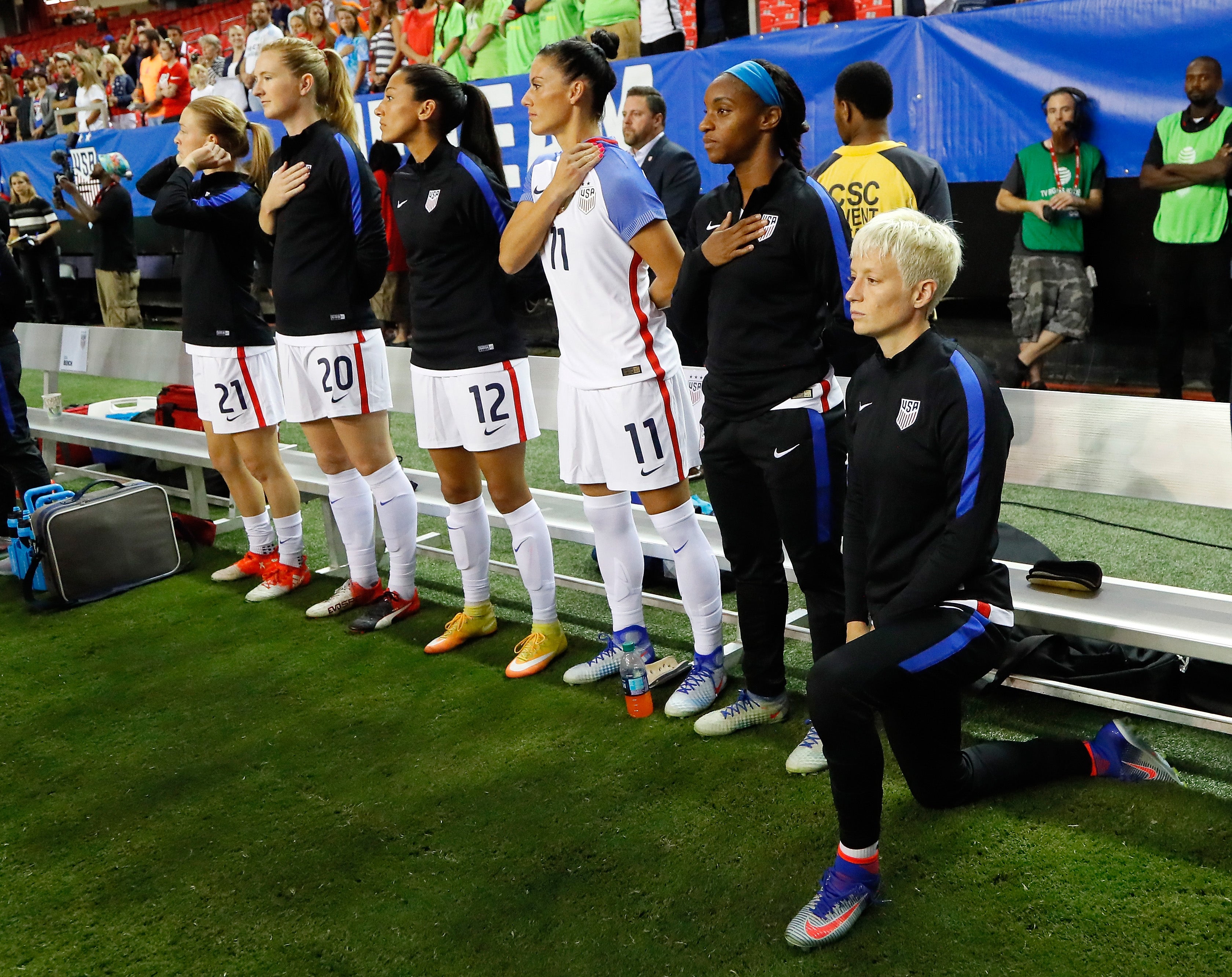Megan Rapinoe accuses former US Women’s National Team coach Jill Ellis of failing to support her over ‘take a knee’ stance
Reigning Women’s Player of the Year feels Ellis failed to back her when US Soccer opposed her anti-racism stance back in 2016 and explains why it helped to gain a greater understanding of racial inequality

Your support helps us to tell the story
From reproductive rights to climate change to Big Tech, The Independent is on the ground when the story is developing. Whether it's investigating the financials of Elon Musk's pro-Trump PAC or producing our latest documentary, 'The A Word', which shines a light on the American women fighting for reproductive rights, we know how important it is to parse out the facts from the messaging.
At such a critical moment in US history, we need reporters on the ground. Your donation allows us to keep sending journalists to speak to both sides of the story.
The Independent is trusted by Americans across the entire political spectrum. And unlike many other quality news outlets, we choose not to lock Americans out of our reporting and analysis with paywalls. We believe quality journalism should be available to everyone, paid for by those who can afford it.
Your support makes all the difference.US Women’s footballer Megan Rapinoe has accused two-time World Cup-winning coach Jill Ellis of failing to show any support when her international future was jeopardised after she took a knee to show support in the fight against racial inequality.
The reigning Fifa Women’s Player of the Year became the first white American athlete to follow NFL quarterback Colin Kaepernick’s example and take a knee during the national anthem in 2016, despite little support from her teammates or bosses at US Soccer. The image of Rapinoe kneeling next to her standing teammates immediately spread around the world, helping to raise awareness of racial inequality but also exposing her to a torrent of criticism and hate from those who did not agree with her views.
Rapinoe has taken a lead in speaking her mind for equal rights and was a prominent voice in the US National Women’s Team’s legal case against US Soccer over unequal pay compared to the men’s side.
But she has revealed in her new autobiography, One Life, that she felt former US manager Jill Ellis failed to support her during ‘an uncomfortable time’ when her international career was on the line.
"I'm proud of it, to be honest. I'm proud of speaking my mind and doing the right thing. I feel this is how change is made,” Rapinoe wrote in an extract published by the BBC.
"Any time I have someone try to explain or argue with me about kneeling or arguing, it's just an incoherent, fumbling, patriotic mess, right? Taking a knee sharpened my understanding of what I did, how I supported Colin and sharpened my resolve in that.
"It was not a comfortable time. I certainly felt that at least my international career was a little bit in jeopardy.
"It showed me a lot of true colours around me in a lot of different ways. The critics yell really loud and I had a federation who clearly didn't support me and, I felt, a coach who really didn't support me, but I had so many people around me who always stuck by me and were with me the whole time.
"But you have a choice of what you do in the world. You just have to be prepared to wear the consequences of your actions."
Rapinoe was eventually joined by her teammates in taking a knee, with the anti-racism gesture gaining traction this year as it was repeated throughout football and other sports, following the brutal killing of African-American George Floyd while in police custody.
All players across every Premier League club have taken a knee before matches since the resumption of the 201920 season in June, while a number of teams in the US have done the same despite divided opinion over the matter.
Rapinoe though believes that it has taken time for, in particular, white male athletes to realise how they benefit from being in a privileged position. Many have spoken out across American sports in 2020 of the need to support their Black, Asian and Mixed Ethnicity teammates, and Rapinoe believes that while they are not to blame for the issues that reared their head more than ever before, they can still take responsibility in repairing the damage.
"A lot of times, white athletes, particularly male athletes, don't feel the effects that other people do; they don't feel the effects of racism, sexism, misogyny or pay inequity,” she added.
"We don't speak out because we are privileged and we don't have to. It comes in part from a lack of examination of your own life and the world around you.
"For white people and probably white men in general, they don't really have to analyse the world around them to be successful. For example, if you're gay, you're constantly traversing a heteronormative world.
"While it is not necessarily people's fault - people that were born now didn't create the country the way it was created - that doesn't mean you don't have a responsibility to it."



Join our commenting forum
Join thought-provoking conversations, follow other Independent readers and see their replies
Comments